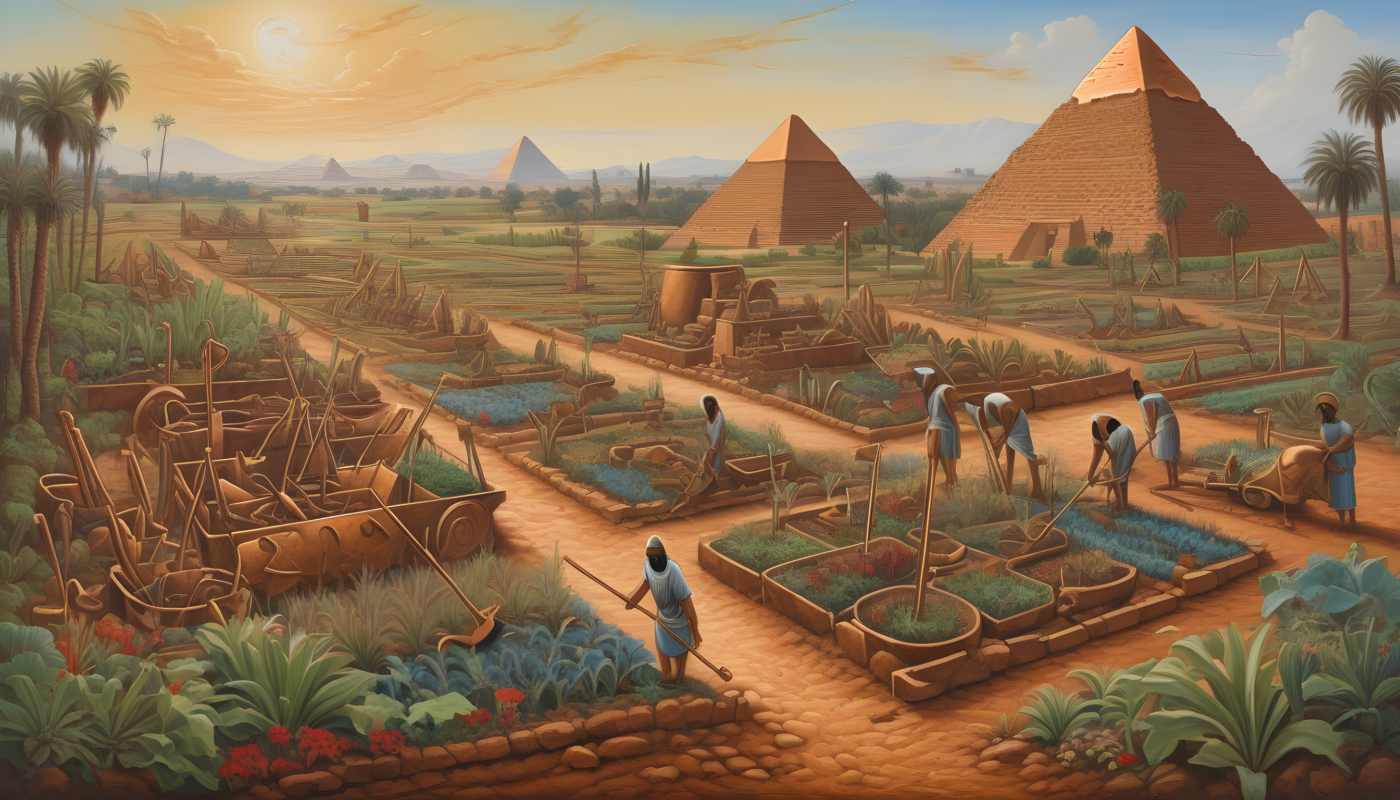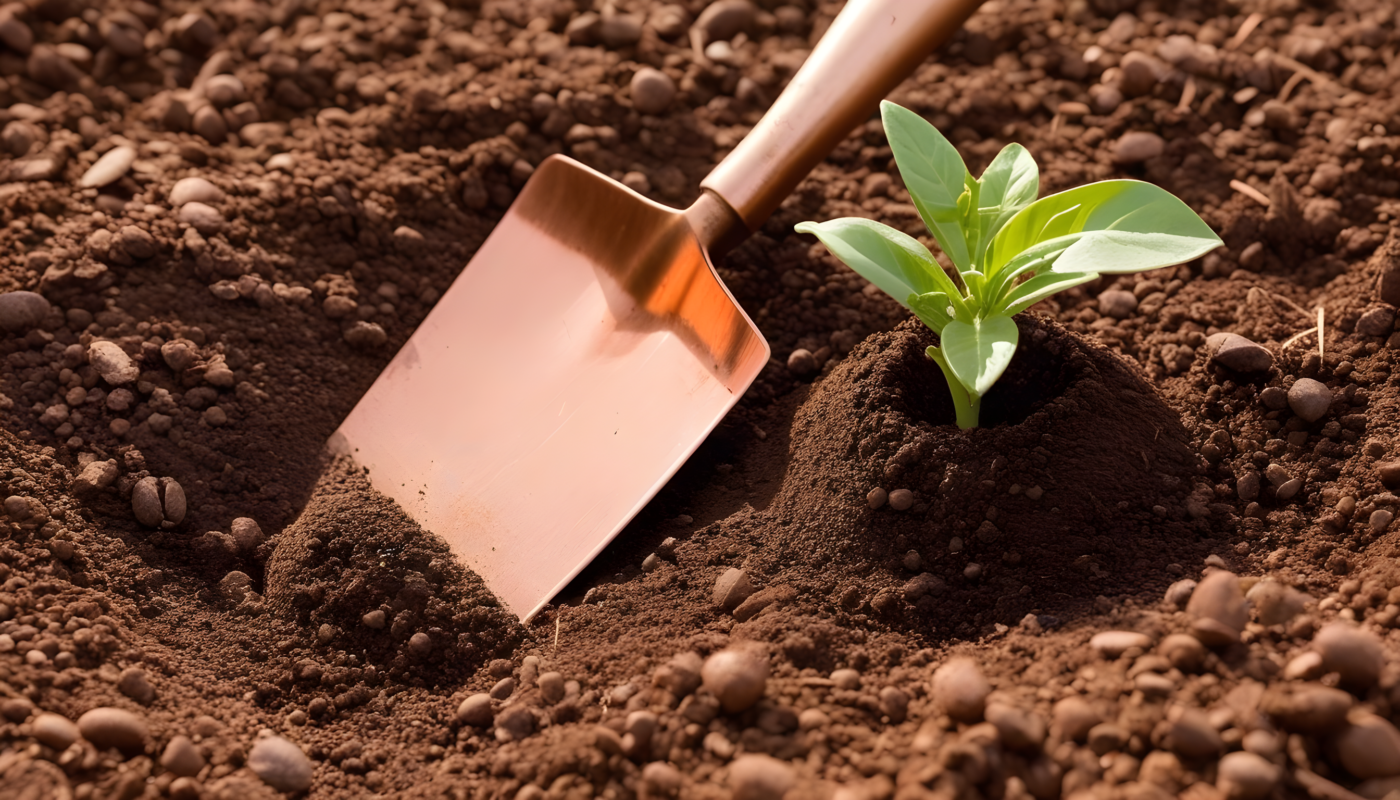Digging Deeper into Copper Tools for the Garden
When we think of gardening tools, visions of sturdy steel spades and trowels often come to mind. But did you know that copper garden tools have a rich history dating back thousands of years? In this insightful journey through time and soil, we’ll explore the fascinating history of copper and bronze in agriculture, compare copper tools to their steel counterparts, uncover the surprising benefits of using copper tools for soil health, and even take a peek into the legendary Viktor Schauberger’s experiments with copper implements.

Copper & Bronze: Ancient Agricultural Innovations
Long before the age of steel and machinery, our farming ancestors relied on the timeless beauty of copper and its alloy, bronze, for their agricultural needs. The use of copper in agriculture can be traced back to ancient civilizations like the Egyptians, Greeks, and Sumerians with evidence dating back as early as 3,000 BC – that’s five thousand years ago! But it wasn’t just pure copper these early agriculturalists were using in the fields, they had to blend pure copper with tin in order to make the tools strong enough for their needs. The result was bronze, a copper-tin alloy, which was particularly prized for its durability and strength and is typically a ratio of 90% copper to 10% tin. The Bronze Age ushered in an era of more efficient farming practices, thanks to tools like bronze plows, sickles, and hoes. These innovations not only made cultivation easier but also improved crop yields, contributing significantly to the development of human civilization. When the iron age came around 1,200 BC, bronze tools slowly faded into the sands of time as iron ore was more readily available and abundant than copper and tin. Since iron was easier to find and as smelting processes improved, it was much cheaper to produce iron tools and weapons and in large amounts.
Copper vs. Steel: A Clash of Gardening Titans
Modern gardeners are no strangers to steel tools, which have become the standard in today’s gardens. However, copper tools offer unique advantages that are worth considering:
Enhanced Soil Health: Copper garden tools have proven to be effective in enhancing soil health by preventing the growth of harmful pathogens. Copper possesses antibacterial and antifungal properties that suppress the growth of microbes responsible for plant diseases. This can lead to healthier plants and a more abundant garden. Researchers have found that copper tools can inhibit the development of common plant diseases such as powdery mildew, damping-off, and various fungal infections. There are countless cases of gardeners claiming a significant decrease of slugs and snails once they began using copper tools.
Copper tools help prevent the spread of diseases in the garden. Pathogens can easily transfer from one plant to another through contact with contaminated tools. However, copper’s natural antimicrobial properties minimize the risk of such transfers, thereby safeguarding your plants and promoting overall garden health.
Steel is magnetic and copper is not. When the magnetism in steel interacts with the soil, it disrupts the energetic field and throws off the natural balance of the soil’s ecosystem. Copper on the other hand is an excellent conductor of electricity and since it is not magnetic, its conductive properties help promote and enhance the ecosystem of soils and the plants in them.
Additionally, copper tools are adept at maintaining proper soil aeration and structure. They minimize soil compaction, which can lead to waterlogged or oxygen-deprived soil. Healthy, aerated soil allows plant roots to access vital nutrients and moisture more easily, leading to stronger, more resilient plants.
Improved User Experience: Copper garden tools offer an enhanced user experience due to their ergonomic design and lightweight nature. Unlike traditional steel tools, copper tools are lighter and easier to handle, reducing strain and fatigue during prolonged gardening sessions. Their smooth and sleek surfaces reduce friction, allowing for effortless digging, planting, and weeding. As a result, you can work comfortably and efficiently, maximizing your productivity in the garden.
Copper tools are known for their durability, many that are available on the market come with long guarantees. They are resistant to wear, corrosion, and rust, ensuring a longer lifespan compared to other materials. This durability translates into reduced maintenance and replacement costs, allowing you to enjoy the benefits of copper tools for years to come.
Increased Sustainability: One of the most notable advantages of copper garden tools is their contribution to a more sustainable gardening practice. First and foremost, copper is an environmentally friendly material. It occurs naturally and can be recycled, reducing the demand for new resources. By opting for copper tools, you can minimize waste and promote a more sustainable approach to gardening. Production of steel is a much more toxic process than copper and bronze.
Additionally, copper tools have the potential to reduce the need for chemical fertilizers and pesticides. Copper’s antimicrobial properties help control diseases, reducing the reliance on chemical treatments. By using copper tools, you can adopt organic gardening practices, promoting a healthier ecosystem and limiting the negative impact of conventional gardening on the environment. Some biodynamic practices require the use of copper in the garden.
Copper Tools and Soil Health
One of the most compelling reasons to consider copper tools for your garden is their positive impact on soil health. Copper’s natural properties can help create an environment where beneficial microorganisms thrive while discouraging the growth of harmful pathogens. This promotes healthier, more robust plant growth and reduces the need for chemical interventions.
Additionally, copper tools are adept at maintaining proper soil aeration and structure. They minimize soil compaction, which can lead to waterlogged or oxygen-deprived soil. Healthy, aerated soil allows plant roots to access vital nutrients and moisture more easily, leading to stronger, more resilient plants.
Viktor Schauberger
In the early 20th century, Austrian naturalist Viktor Schauberger delved into the mysteries of water, energy, and agriculture. Schauberger believed in the intrinsic vitality of water and its role in nurturing life. He conducted numerous experiments with copper tools, particularly copper plows, and observed remarkable results.
Schauberger’s copper plow experiments suggested that copper tools could enhance soil fertility and plant growth through their harmonizing effects on the surrounding environment. Although his ideas were often considered unconventional, his work continues to inspire a deeper understanding of the relationship between nature and technology.
Embracing Copper in Your Garden
As we’ve uncovered a brief history of copper and bronze in agriculture, explored some of the differences between copper and steel tools, and delved into the benefits of using copper tools for soil health, one thing becomes clear: bronze is more than an alloy in the garden – it’s an ally.
The gardening expert and No-Dig champion Charles Dowding recommends copper tools and his copper trowel is his trowel of choice.
Whether you’re an experienced green thumb or just starting your gardening journey, consider adding a touch of copper to your toolshed. These attractive, earth-loving implements have stood the test of time and may promise a brighter, healthier future for your garden. So, don your gardening gloves, grab a copper trowel, and watch your garden flourish like never before. It’s time to unearth the power of copper!

